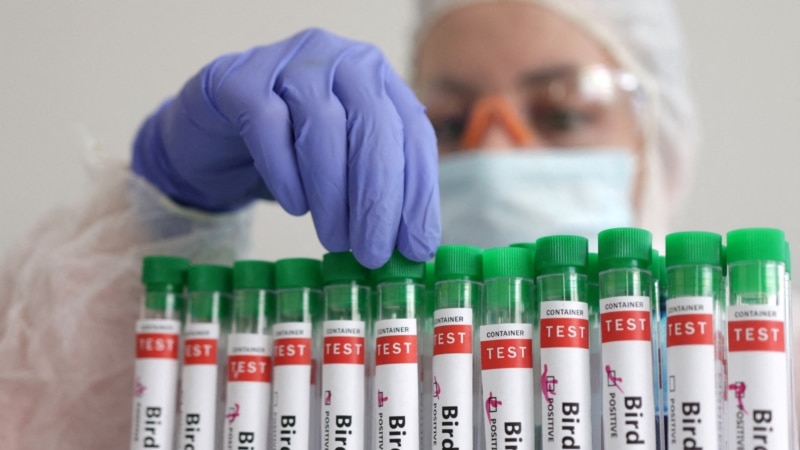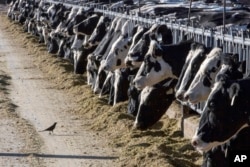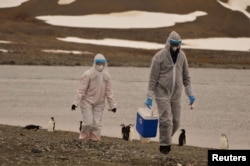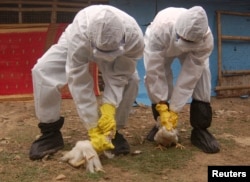Conspiracy theorists seize on bird flu infections to accuse US of staging pandemic
On May 30, the United States Centers for Disease Control and Prevention (CDC) reported a third case of human infection with bird flu, the fourth in the U.S. since 2022.
The CDC says the virus is “highly pathogenic avian influenza” with a current strain identified as H5N1.
The latest two human infections occurred in the state of Michigan, and a previous case was recorded in Texas. All three people caught the virus after direct contact with infected cows.
None of those cases came through human-to-human transmission and the CDC assesses the human health risk from H5N1 bird flu as “low.”
Since news broke of those human infections in the U.S., accounts on X and other social media platforms widely shared a conspiracy theory piece by U.S.-based Natural News, a website that proclaims itself a “science-based natural health advocacy.”
But Harvard University Kennedy School’s Disinformation Review describes Natural News as “far-right” and “pseudoscientific.”
In a May 26 article, Natural News writer Lance D. Johnson “wondered” whether the human strain of the bird flu is being “lab-developed for mass release into the population,” because the “U.S. government” has already “developed and stockpiled” a bird flu vaccine “that is not for birds or other animals.”
“Since a vaccine is already developed and stockpiled for a bird flu strain that hasn’t even evolved yet, the economic and societal pressure to unleash a new pandemic is imminent,” Natural News wrote.
Those claims are false.
Bird flu is nothing new and, like other strains of influenza, the virus is constantly evolving. Likewise, avian flu vaccines for humans have been around for more than a decade.
Researchers detected avian influenza in the 19th century and first identified H5N1 in domestic waterfowl in Southern China in 1996.
The first human case of H5N1 was detected in Hong Kong in 1997
Natural News claimed that the recent H5N1 strain results from genetic alterations that allowed the virus infect various animals and that its mutations are proof of DNA manipulations.
John Swartzberg, clinical professor emeritus of infectious diseases at UC Berkeley’s School of Public Health, called that “nonsense.”
“Influenza is what we call a promiscuous virus … it has incredible plasticity. Its ability to change itself, to mutate with alacrity, is really phenomenal,” Swartzberg told Polygraph.info.
Swartzberg said H5N1 follows the same pattern of other influenza viruses — “spilling over” into other animal species once a previous host has developed immunity.
That is particularly true for avian strains of Influenza A viruses, which researchers call “far more diverse” and “more easily generate novel strains than the more specialized human viruses.”
The degree to which H5N1 has gained the capacity to infect different mammals, particularly dairy cows, “came as a big surprise” to those who study influenza viruses, William Schaffner, professor of infectious diseases at Vanderbilt University, told Polygraph.info.
“It’s able to transmit, it is able to spill over to other mammals, and it does that by subtle mutations in its genetic code,” Swartzberg said. “And, when it does that, it’s often very virulent to the new host.”
Calling lab-creation claims conspiratorial, Schaffner said the virus evolved “through conventional, normal mutations in nature.”
“This did not happen in the laboratory, this did not happen through so-called ‘gain of function’ research,’ which involves genetically modifying viruses to give them new functions, like the ability to infect animals they previously could not infect.
Globally, the bird flu has infected less than 1,000 people since 2003. However, the mortality rate thus far was very high — roughly 50%.
“[H5N1] is surely not going to cause a 50% mortality rate once you start to see millions of people getting infected — if that happens. The mortality rates will dramatically drop. Still, 1 or 2% of the population of the world would be an enormous number,” Swartzberg said.
Public health experts have been increasing disease surveillance to help prevent an outbreak and readying readying new vaccines.
Conspiracy theorists have seized on those pandemic prevention efforts to spread fear: for example, Natural News’s false claim that the development of vaccines “for a bird flu strain that hasn’t even evolved yet” is evidence of an “imminent” man-made pandemic.
And “stockpiles” of bird flu vaccines for humans are not new. The U.S. Food and Drug Administration (FDA) licensed the first human vaccine for bird flu in 2007.
Other vaccines have followed, but not [yet] for the latest strain.
“There are no vaccines specifically developed for preventing the current strain of bird flu, A(H5N1) virus clade 2.3.4.4b. However, some countries have human H5 vaccines, which WHO assesses to be effective against clade 2.3.4.4b,” a spokesperson from the World Health Organization told Polygraph.info.
New vaccines to combat evolving strains of H5N1 are in the pipeline, with GlobalData identifying 13 such vaccines in active clinical development.
Beyond the development of new vaccines, public health authorities in the U.S. maintain the National Pre-Pandemic Influenza Vaccine Stockpile to “prepare and respond effectively to future influenza pandemic threats.”
Testing the efficacy of older H5N1 vaccines — some stored for a decade or more — is part of that effort.
Natural news also claimed that some form of gain-of-function research would have been necessary to manufacture and stockpile vaccines “with certainty of their effectiveness.”
Swartzberg says that is “absolutely not” the case.
“What we know is the genetic structure of the currently circulating virus in cattle, and the genetic structure of the humans who have been infected with this particular sub-variant of H5N1, and that’s what we would produce a vaccine for,” Swartzberg said.
Christy Gray, director of the Division of Immunization in the Office of Epidemiology at the Virginia Department of Health, told Polygraph.info the creation of a candidate vaccine virus (CVV) for a novel bird flu virus “is a multistep process that takes months.”
The CDC outlines the process for developing a CVV here.






